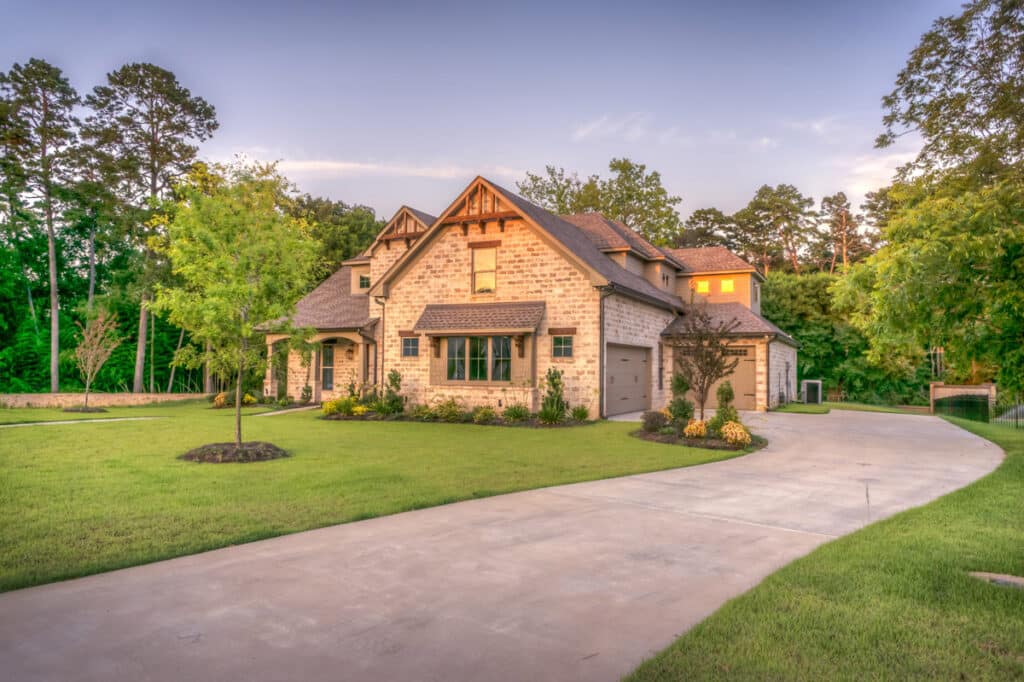Installing a driveway or new driveway surface can do wonders for the curb appeal of your home, and it can even increase the sale value if you are flipping houses. Perhaps more importantly, it can make you feel proud of how your home looks every time you park your car. But some driveway materials can require a relatively large amount of maintenance and potential maintenance costs. If you would prefer to have a driveway surface that essentially takes care of itself, there are lots of options out there so we spoke to our friends Terraform Driveways for a few tips. Let’s take a look at a few.

Resin driveways
Resin driveways are potentially the best driveway in terms of low maintenance. A resin driveway surface is created from a mixture of loose aggregates and resin, laid on top of a concrete sub-base. This type of driveway material will give you the warm look of loose stones with the smooth surface of a more durable driveway surface.
Unlike other surfaces, resin driveways do not need to be resealed, which can lower both maintenance costs and time. For regular maintenance, all you’ll really need to take care of is cleaning. This will involve regular sweeping to get rid of debris and a jet wash to keep it clean.
A resin driveway is weed-resistant, but weeds can still grow here and there, especially if there are any joints. So adding some weed-killer every now and again can be a good idea.
Resin driveways are prone to get marked by tyres and oil stains. Prevention is the best method of reducing the risk of marks, and this includes not turning the wheel of your vehicle while it is parked on the driveway surface and ensuring that you take care when conducting vehicle maintenance on the driveway.
Resin driveways can also be more expensive and time-consuming to install than other driveway surface solutions.
Concrete driveway
Concrete driveways are a popular low-cost and low-maintenance driveway surface option. They have a quick installation time so your driveway will be up and running as soon as possible, and there are lots of design options if you choose to go for a pattern imprinted concrete driveway.
Concrete is one of the most durable driveway materials, which is why it is used so widely. It also requires relatively little maintenance. You will need to make sure that the driveway is kept clean, so sweeping and jet-washing as and when is a good idea. You will also need to re-seal the driveway surface every year or so.
As with a resin driveway, concrete is prone to staining from oils and grease so you will need to be careful about avoiding spills. You also shouldn’t use any de-icer on your concrete driveway because this can lead to surface damage. If you want to add friction, a layer of sand would be a better option for a concrete driveway.
Asphalt driveway
Asphalt driveways are similar to concrete but there are some differences. Rather than the aggregate being mixed with cement, an asphalt driveway surface will have the aggregates mixed with bitumen.
Asphalt driveways are less vulnerable to cracking than concrete and they aren’t damaged by salt or de-icers. And, in general, their maintenance needs are pretty much the same, including needing to be resealed every couple of years.
Block paving driveway
A block paved driveway can be created using cement blocks or kiln-fired bricks. These are arranged on a wet concrete base to create a patterned and attractive driveway surface. Blocks and bricks are durable materials that won’t require too much maintenance.
As with concrete and asphalt driveways, the majority of the maintenance needs for a block paving driveway will be regular cleaning, including sweeping and jet-washing. Unlike concrete and asphalt, however, block paving will inevitably have gaps between the blocks through which weeds can grow. So you will need to regularly use weed killer in the gaps to stop weed growth.
The joints in your block paving will also need to be repointed in the future, but this job can wait for many years before it needs doing. If you do notice any areas in the block paving where you think repointing should be done, it is a good idea to do it sooner rather than later.
Gravel driveway
Unlike block paving, concrete, and asphalt driveway material options, gravel driveways don’t demand perfection to keep them looking attractive. And this can translate to lower maintenance needs.
Gravel driveways are a quick, easy, and inexpensive method of creating a driveway surface. You can even do it yourself if you are so inclined. The gravel made of loose aggregate is simply poured into a sub-base (that has a weed protective layer) and compressed.
Of course, this means that you will get loose stones which is something you don’t have to deal with from block paving and other driveway options, but you can easily top your gravel driveway back up with new stones. This is usually every two years but can be done more frequently if needed.
Otherwise, gravel driveways mainly require raking to keep the surface looking good as well as regular weed control. Gravel is a very porous surface so weeds will grow through.
Tarmac driveways
When installed correctly, tarmac can be a low-maintenance new driveway surface. Like concrete and asphalt, the main maintenance job will be cleaning the whole driveway when it needs it. You can seal the tarmac as part of your ongoing maintenance and you will need to be careful of spillages. It is UV resistant, however, so sealing isn’t as vital as it is with concrete or asphalt.
The bottom line
If you’re looking for the best driveway surface in terms of maintenance, you do have a lot of choices. Block paving driveways, concrete driveways, resin driveways, asphalt driveways, tarmac driveways, and gravel driveways are all low-maintenance options when installed correctly. Which one would be the best option for you will depend on the look you want and your choice of budget.

